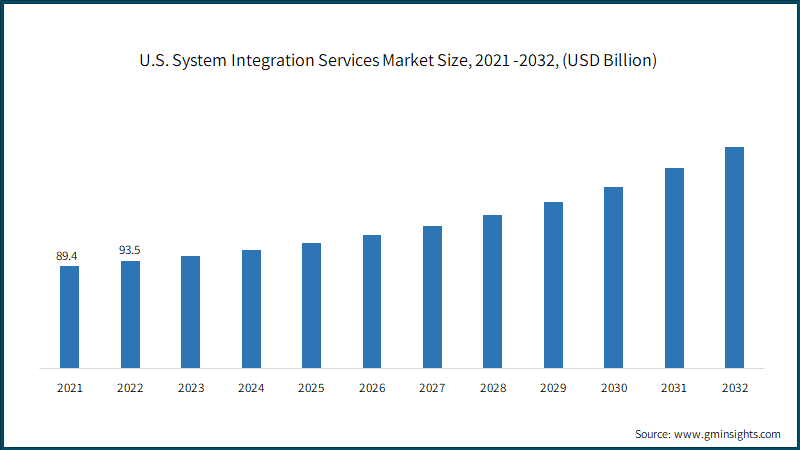Get a free sample of System Integration Services Market
Thank you!
Your inquiry has been received. Our team will reach out to you with the required details via email. To ensure that you don't miss their response, kindly remember to check your spam folder as well!
Form submitted successfully!
Error submitting form. Please try again.
Get a free sample of System Integration Services Market
Thank you!
Your inquiry has been received. Our team will reach out to you with the required details via email. To ensure that you don't miss their response, kindly remember to check your spam folder as well!
Form submitted successfully!
Error submitting form. Please try again.
System Integration Services Market Analysis

Based on services, the system integration services market is divided into infrastructure integration, application integration, and consulting. The infrastructure integration segment accounted for a business share of around 37% in 2022. Infrastructure integration is expected to witness substantial growth in the market. As businesses expand their digital footprint, the need to integrate diverse infrastructure components becomes paramount. This segment encompasses the integration of hardware, networking solutions, data centers, cloud services, and IoT devices. With the increasing adoption of hybrid & multi-cloud environments, companies will require expertise to ensure seamless connectivity and data flow between on-premises & cloud-based infrastructure.
Additionally, the growing adoption of edge computing necessitates the integration of edge devices and data processing capabilities. Infrastructure integration enables organizations to optimize resource utilization, enhance scalability, and ensure a robust foundation for digital transformation initiatives, making it a pivotal growth area in the market.

Based on industry vertical, the system integration services market is categorized into IT & telecom, defense & security, BFSI, oil & gas, healthcare, transportation, retail, food & beverages, automotive, and others. The Banking, Financial Services, and Insurance (BSFI) segment held around 17% revenue share in 2022. The segment extensively utilizes system integration services to streamline operations, improve security, and enhance customer experiences. Integration enables seamless data sharing across banking applications, fraud detection systems, and customer relationship management platforms. With the rising adoption of digital banking, FinTech innovations, and increased regulatory compliance requirements, the demand for system integration services in the BFSI segment is expected to surge. This growth will facilitate efficient banking operations, better customer services, and robust data security, making it a significant growth driver in the market.

North America led the system integration services market with a share of over 33% in 2022 and will witness significant growth over the forecast period. The region has a mature IT infrastructure with a high adoption rate of advanced technologies, increasing the demand for robust system integration services. Furthermore, the stringent regulatory requirements in industries including healthcare and finance are driving the need for compliant system integrations.
Additionally, North American businesses are heavily investing in digital transformation, cloud computing, and data analytics, all of which require expert system integration services. Emerging technologies, such as AI, IoT, and cybersecurity, are making North America a prime region for the expansion of system integration services, propelling market trends.
Who are the major contenders in system integration services sector?
Mulesoft, SAP, IBM, Microsoft, Oracle Corporation, Tata Consultancy Services, and Infosys among others.
How big is North America system integration services market?
North America led the global system integration services industry with a share of over 33% in 2022 and will witness significant growth through 2032, as the region has a mature IT infrastructure with a high adoption rate of advanced technologies.
What is the size of the system integration services market?
The system integration services industry was valued over USD 379 billion in 2022 and is estimated to register a CAGR of over 10% between 2023 and 2032, owing to the rising adoption of cloud services.
Why is infrastructure integration service gaining traction in system integration market?
The infrastructure integration segment accounted for a market share of around 37% in 2022 and is expected to witness substantial growth as the need to integrate diverse infrastructure components becomes paramount with businesses expanding their digital footprint.